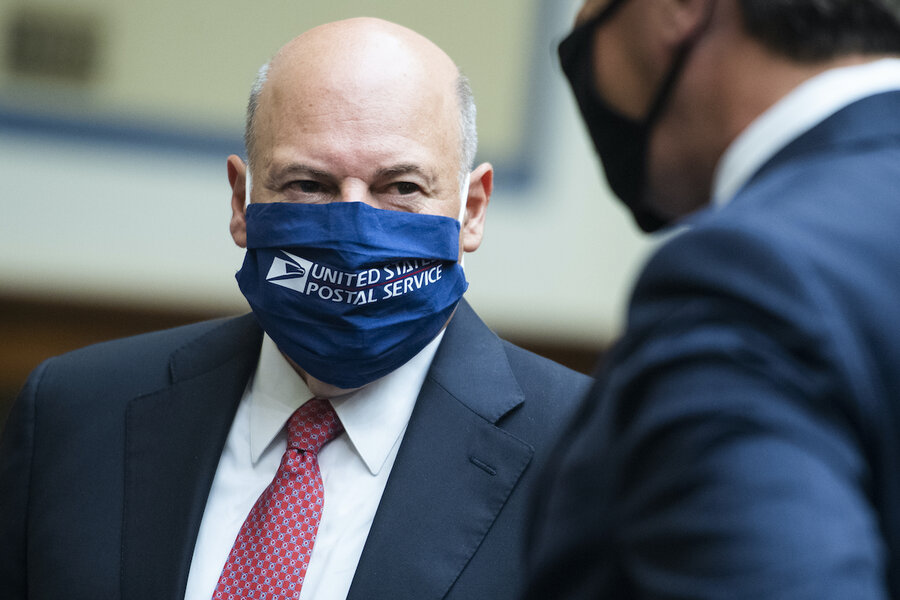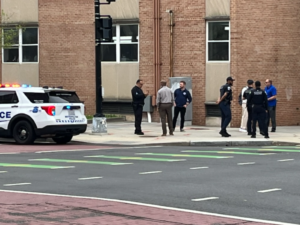Postmaster General Louis DeJoy’s Congressional Hearings and Recent Allegations Amid Mail-in Voting Crisis

Image courtesy of csmonitor.com
By Eva Lynch
To cut costs or not to cut costs? To bundle donations or not to bundle? These are the questions that plague the conscience of Postmaster General Louis Dejoy. As a result of recent controversies surrounding his leadership of a widely-favored government agency accelerating deeper into financial ruin, the 2020 election marks the first in which the fate of the United States Postal Service may be the deciding factor for many voters.
The possibility of mail-in voting has contributed significantly to this controversy, especially amidst the Postal Service’s financial struggle and Postmaster General Louis DeJoy’s actions ahead of the election.
While modern technologies, a booming preference for online retail, and a requirement by Congress to pre-fund retirement benefits, actively contribute to the poor financial state of the USPS pre-pandemic, the effect of COVID-19 on the economy has exacerbated the issue exponentially. Researchers estimate that the USPS’s annual debt more than doubles its earnings.
The USPS’ indebtedness is not a result of obsolescence, however, as it is the only way to send and receive mail for many residents of the most rural parts of the country, where private companies dare not deliver. Further, the USPS is one of the most popular government agencies, reporting a 91% satisfaction rate among Americans, according to a Pew Research Center study. Rather, it is a result of the under prioritization of the agency by public officials and within coronavirus-related stimulus bills. The postal service also does not reap any taxpayer dollars to fund its operations; instead, it and its over half a million employees rely entirely on revenue from mail and parcel delivery.
As a result of the mounting fiscal crisis, Postmaster General DeJoy has implemented several cost-saving measures, including slashing overtime opportunities, removing around 15 percent of high-speed processing letter machines, imploring election officials to pay the full rates instead of the usual discounted rates for bulk envelopes, and asking employees to retire early. Changes also included the removal of trademark blue USPS Collection Boxes, disproportionately in Democratic states; this particular modification was not specified by DeJoy in his preliminary reports of cost-cutting measures. Removal of these boxes quickly sparked a Twitter firestorm when users flooded the platform with stories of boxes disappearing from their supposedly inveterate posts. The virality forced the postal service to suspend the removal of these boxes in early August, as well as to suspend all cost-cutting measures in the next week amidst pressure from House and Senate Democrats.
“We cannot allow two things as sacred as the Post Office and our elections to be undermined,” Senate Minority Leader Chuck Schumer said in a Tweet.
Following disproportionate blue box removal as well as the postal service’s notification of 46 states that many ballots will not be delivered in time to be counted, a caveat aggravated by DeJoy’s cost-cutting changes, the Postmaster General was required to testify in front of Congress to address skepticism of his true intentions.
The first hearing was facilitated by the Senate Homeland Security and Governmental Affairs Committee on Friday, August 21, during which Democrats demanded DeJoy provide more information regarding the data he consulted to make operational changes.
During the hearing, DeJoy attempted to self-acquit by distancing himself from the recent changes, blaming much of the mail delays that Americans have been experiencing on the COVID-19 crisis, though lamenting that the postal service has not been able to operate as consistently as usual. He also proclaimed strong trust in the postal service’s ability to handle the expected influx of ballots and deliver them in a timely manner. Breaking from Trump’s rhetoric and undoubtedly calming Democrats, DeJoy voiced support for mail-in voting, adding that he has voted successfully by mail many times. The hearing maintained an element of cordiality throughout; the same was not true for the House hearing a few days later.
The following hearing occurred on Monday, August 24, and was led by the Democrat-dominant House Oversight Committee.
In a hostile hearing, Democrats did not waste time and threatened DeJoy with a subpoena should he continue to withhold information regarding changes to the postal service, following a harsh indictment of his leadership during his five-month tenure. DeJoy again distanced himself from allegations of withholding information, primarily about removing blue collection boxes, but said he would comply with a subpoena should one be issued.
One of the issues on which the committee was prepared to press DeJoy was regarding his plan to replace sorting machines that were removed as part of preliminary cost-cutting measures; DeJoy held his ground and said he would not replace these machines as they are “unnecessary,” but assured representatives this would not delay election ballots.
Later in the hearing, Rep. Katie Porter (D-Calif.) pressed DeJoy on basic knowledge of the postal system, specifically on the price of a postage stamp and of mailing a postcard.
“I’ll submit that I know very little about a postage stamp,” DeJoy conceded.
The next step in the saga seems to be an imminent investigation into allegations that DeJoy is acting as a partisan operative for President Donald Trump, who has been vocal in his indictment of mail-in voting as a viable solution to an election during a pandemic. While DeJoy was not appointed by Trump, he has donated a significant amount of his $110 million net worth to Trump’s campaign and administration, including a $1.2 million donation to the Trump Victory Fund prior to the 2016 election.
DeJoy has recently come under fire following a Washington Post expose published on Sunday, featuring accounts from employees of DeJoy’s former company New Breed Logistics. Following the Post’s analysis showing a series of donations by employees, many of them identical in date and amount, several employees came forward and reported pressure by DeJoy to donate to GOP candidates with the promise that he would “get it back to [them] down the road.”
These employees later received reimbursements in full, in the form of special bonuses. Donations from New Breed employees tapered off following DeJoy’s departure from the company in 2015.
While DeJoy’s spokesperson claimed ignorance of any employees feeling pressured, if he is found guilty of this straw-donor scheme, he could face the same felony conviction and jail time as others have for similar schemes. Though DeJoy may be protected by the five-year statute of limitations on this charge, an investigation is likely and has been supported by Trump in a surprise move ahead of the election.
Regardless of the outcome of this possible investigation, the issue of mail-in voting for the 2020 election remains. Most states have published plans for their voters in November, with 21 percent of states mailing ballots directly to their registered voters, 57 percent of states allowing absentee voting for all voters through the normal application process, and the remaining 22 percent of states requiring an excuse to allow absentee voting. For more information about your state’s plan, visit this helpful graphic from the New York Times.








